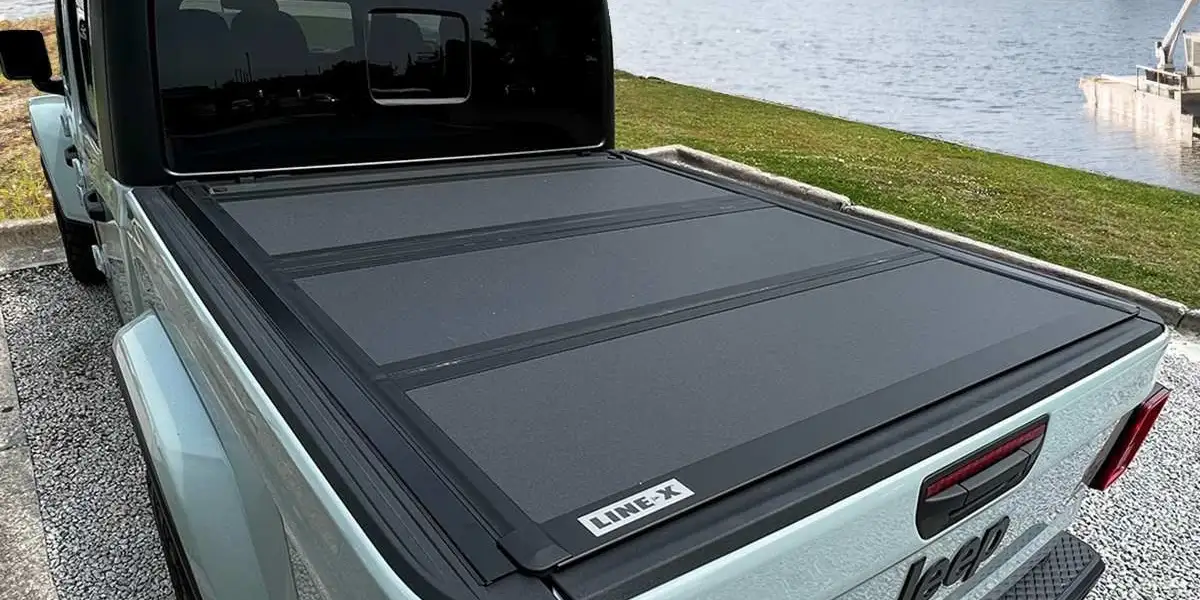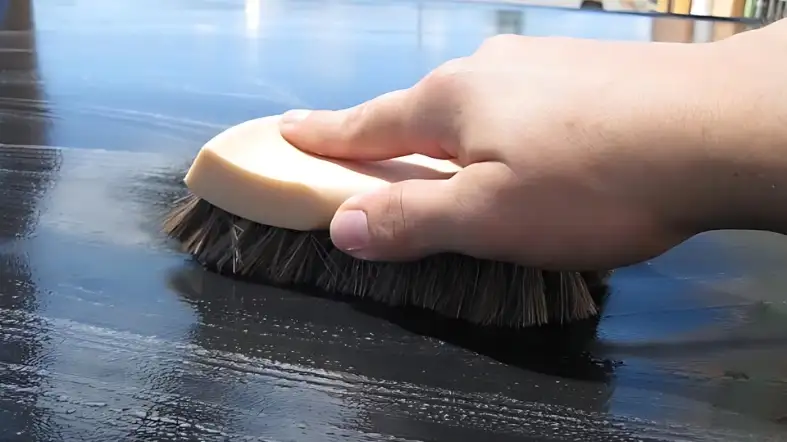Are you tired of seeing scratches and damages on your tonneau cover? Worried about how to maintain its pristine condition?
Our article will illustrate effective strategies and practical tips for protecting your tonneau cover.
Discover simple yet essential methods that will help prolong its lifespan and keep it looking brand new. Ready to safeguard your investment? Let’s learn how to protect your tonneau cover.

How to protect your tonneau cover?
Here is a comprehensive guide to preserving its pristine condition.
Step 1: Regular Cleaning and Maintenance
Regular cleaning is essential. Begin by removing any debris or dirt using a soft brush or cloth.
Then, using a mild soap or a specialized tonneau cover cleaner, gently scrub the surface.
Rinse thoroughly with water and ensure it is completely dry before closing.
Regular maintenance not only removes contaminants but also helps prevent the buildup of grime and prolongs the cover’s lifespan.
Step 2: Avoiding Harsh Chemicals
While cleaning your tonneau cover, it’s important to use gentle and non-abrasive products.
Harsh chemicals, such as bleach or solvents, can damage the cover’s material and compromise its integrity.
Stick to mild soaps or cleaners specifically designed for tonneau covers to avoid any potential harm.
Step 3: Protecting Against UV Rays
The sun’s UV rays can cause significant damage to your tonneau cover over time.
To shield it from harmful UV exposure, consider using a protective spray or treatment with UV inhibitors.
Tonneau covers with these products are protected from fading, discoloration, and cracking.
Step 4: Avoiding Sharp Objects and Impact
Make sure your tonneau cover is properly secured and avoid contact with sharp objects and heavy impact.
Sharp objects, such as tools or equipment, can puncture or tear the cover, while heavy impact may cause dents or cracks.
Taking preventive measures will help maintain the cover’s integrity.
Step 5: Proper Storage and Handling
When not in use, it’s crucial to store your tonneau cover correctly. If removable, carefully remove and store it in a safe and dry location.
Ensure it is kept away from extreme temperatures and harsh weather conditions that could potentially damage the cover.
Proper handling and storage contribute to its longevity and protect it from unnecessary wear and tear.
Step 6: Secure Locking Mechanism
If your tonneau cover includes a locking mechanism, utilize it to protect your belongings and the cover itself.
When the cover is closed, ensure the lock is engaged, providing additional protection against theft or damage.
Step 7: Snow and Ice Removal
To prevent scratches or tears, do not use sharp objects or excessive force to remove snow and ice from your tonneau cover during winter months.
Instead, use a soft broom or a brush with gentle bristles to clear away the snow and ice. Take your time and be cautious to prevent any harm to the cover’s surface.
Step 8: Regular Inspections
Periodically inspect your tonneau cover for any signs of wear, tear, or damage. Look for loose or missing parts, frayed edges, or areas that may require repair.
If you notice any issues, consult the manufacturer’s guidelines or seek professional assistance as soon as possible.
Step 9: Protection Against Theft
To enhance security and protect your tonneau cover from theft, consider utilizing additional security measures.
Options such as tailgate locks, cable locks, or locking bed caps can provide an extra layer of protection.
These measures deter potential thieves and ensure your tonneau cover remains secure.
Step 10: Warranty Coverage and Maintenance Guidelines
Last but not least, learn about the warranty and maintenance guidelines provided by the manufacturer.
Adhering to these guidelines will not only protect your investment but also
What are the recommended cleaning methods for your tonneau cover?

Gather the Necessary Supplies
Before you begin cleaning your tonneau cover, make sure you have the right supplies on hand.
You’ll need a soft brush or cloth, a mild soap or specialized tonneau cover cleaner, clean water, and a microfiber cloth for drying.
Remove Debris and Dirt
Start by removing any debris or loose dirt from the tonneau cover’s surface. Use a soft brush or cloth to gently brush away the particles.
Be thorough, ensuring that you cover the entire surface area.
Prepare the Cleaning Solution
Mix a mild soap or specialized tonneau cover cleaner with water. Follow the manufacturer’s instructions for the dilution ratio.
Scrub the Surface
Dip the soft brush or cloth into the cleaning solution, and gently scrub the tonneau cover in a circular motion.
Pay close attention to any stubborn stains or dirt buildup. Use moderate pressure to avoid damaging the cover.
Rinse Thoroughly
After scrubbing, rinse the tonneau cover thoroughly with clean water. Ensure that all soap or cleaner residue is completely removed.
This step is crucial to prevent any potential damage caused by lingering chemicals.
Dry the Cover
To dry the tonneau cover, pat it dry with a clean microfiber cloth rather than rubbing it.
Make sure the cover is completely dry before closing or storing it.
Apply a Protectant (Optional)
For added protection and shine, you may choose to apply a specialized tonneau cover protectant. These products help shield the cover from UV rays, fading, and discoloration.
Follow the instructions provided by the manufacturer for the correct application method.
Regular Cleaning Schedule
To maintain your tonneau cover’s cleanliness and appearance, establish a regular cleaning schedule.
Depending on usage and environmental factors, aim to clean the cover at least once every one to three months.
Regular cleaning prevents dirt buildup and preserves the cover’s longevity.
Avoid Harsh Chemicals
It’s best to avoid harsh chemicals and abrasive cleaners when cleaning your tonneau cover.
Stick to mild soaps or specialized tonneau cover cleaners that are safe for use on the specific material of your cover.
Protecting in Extreme Conditions
If your tonneau cover is exposed to extreme weather conditions, such as intense sunlight or heavy rain, take additional protective measures.
Consider using a cover or tarp to shield it from excessive UV exposure or moisture. This extra layer of protection helps extend the life of your tonneau cover.
How to maintain and preserve your tonneau cover?

Regular Cleaning Routine
To keep your tonneau cover in optimal condition, establish a regular cleaning routine. Begin by removing any loose dirt or debris using a soft brush or cloth.
Clean the tonneau cover with water and mild soap. Use a sponge or brush to gently scrub the surface. Rinse thoroughly and allow the cover to dry completely.
Avoid Harsh Chemicals
When cleaning your tonneau cover, avoid using harsh chemicals or abrasive cleaners as they can damage the cover’s material.
Maintain your tonneau cover properly with mild soaps or cleaners designed specifically for it.
Protect from UV Rays
The sun’s UV rays can cause fading, discoloration, and deterioration of your tonneau cover over time. Protect it by applying a specialized UV protectant.
Choose a product that is compatible with your cover’s material and follow the manufacturer’s instructions for application.
Regularly reapply the protectant to maintain its effectiveness.
Address Stains Promptly
IIdentify the source of the stain and use a suitable cleaner or stain remover for the specific type of stain on your tonneau cover.
You should test the cleaner on a small, inconspicuous area first. Follow the instructions provided by the cleaner manufacturer.
Lubricate Moving Parts
If your tonneau cover has moving parts or hinges, lubricate them regularly to ensure smooth operation and prevent rust or corrosion.
Maintain the mechanism by applying lubricant according to the manufacturer’s recommendations.
Inspect for Damage
Keep an eye out for tears, cracks, and loose components on your tonneau cover. Inspect the seals and weatherstripping too.
Repair or replace the affected parts if necessary. Consult the manufacturer’s guidelines or seek professional assistance if necessary.
Proper Storage
If you need to remove the tonneau cover temporarily, store it properly to prevent damage. Clean and dry the cover thoroughly before storage.
Store it in a clean, dry place away from extreme temperatures, direct sunlight, or other potential sources of damage.
Be Mindful of Weight Distribution
Tonneau covers should be distributed evenly to prevent excessive stress on specific areas. Avoid placing heavy or sharp objects that can puncture or damage them.
Use cargo management systems or organizers to secure items and distribute weight evenly.
Follow the Manufacturer’s Guidelines
Tonneau cover manufacturers may provide specific care instructions, maintenance schedules, and warranty information for their specific models.
Adhering to these guidelines ensures proper maintenance and preserves your warranty coverage.
Regular Inspections and Maintenance
Perform regular inspections of your tonneau cover to identify any issues or potential areas of concern. Check for loose hardware, damaged seals, or signs of wear.
Address any problems promptly to prevent further damage and ensure the longevity of your tonneau cover.
What are the common mistakes to avoid when caring for your tonneau cover?

Using Harsh Chemicals
Your tonneau cover will become discolored, deteriorated, or even torn if you use harsh chemicals on it.
Stick to mild soaps or specialized tonneau cover cleaners recommended by the manufacturer.
Neglecting Regular Cleaning
If you fail to clean your tonneau cover regularly, dirt, debris, and stains can accumulate, causing damage if left untreated.
Establish a cleaning routine and stick to it to maintain the cover’s cleanliness and appearance.
Improper Storage
Tonneau covers can suffer damage from improper storage. They can be folded or rolled incorrectly, stored in damp areas, or exposed to extreme temperatures.
Follow the manufacturer’s guidelines for proper storage to preserve its integrity.
Using Excessive Force
When opening and closing your tonneau cover, don’t apply excessive force. This can lead to premature wear or even breakage of parts.
Handle the cover with care and follow the recommended operating instructions.
Neglecting Inspections
By neglecting inspections, you might overlook loose hardware, torn seals, or other issues that require immediate attention.
Regular inspections allow you to catch and address problems early on.
Ignoring Manufacturer’s Guidelines
Each tonneau cover model may have specific care instructions and maintenance guidelines provided by the manufacturer.
Following the manufacturer’s instructions can prevent warranty coverage from voiding or causing damage.
Allowing Snow and Ice Buildup
Winter snows can damage your tonneau covers due to their weight, freezing and thawing cycles, and freezing and thawing cycles.
Remove snow and ice promptly using appropriate tools or brushes.
Neglecting UV Protection:
Tonneau covers can fade, discolor, and deteriorate over time if they are not protected against the sun’s rays.
Protect your cover by regularly applying a suitable protectant.
Using Improper Cleaning Tools
Tonneau covers can be scratched or damaged by rough or abrasive cleaning tools.
Stick to soft brushes or cloths specifically designed for cleaning tonneau covers to avoid causing harm.
Delaying Repairs
If you notice any signs of damage, such as tears, cracks, or loose components, it’s essential to address them promptly.
For proper repair methods, consult the manufacturer’s guidelines or seek professional assistance.
FAQs
How Often Should I Clean My Tonneau Cover?
It is recommended to clean your tonneau cover every one to three months, depending on usage and environmental factors.
Can I Use Any Cleaning Products On My Tonneau Cover?
No, it is important to avoid harsh chemicals or abrasive cleaners. Use mild soaps or specialized tonneau cover cleaners.
Is It Necessary To Store My Tonneau Cover Properly?
Yes, proper storage helps prevent damage to your tonneau cover.
Clean and dry it thoroughly before rolling or folding it according to the manufacturer’s instructions.
Store it in a clean, dry area away from extreme temperatures and direct sunlight.
Should I Use A Cover Or Tarp To Protect My Tonneau Cover?
Using an additional cover or tarp can provide extra protection during extreme weather conditions such as heavy rain, snow, or intense sunlight.
Can I Use My Tonneau Cover As A Loading Platform?
Your tonneau cover should not be used as a loading platform, as it can cause damage. Do not place heavy or sharp objects directly on the cover.
Final Words
Keep your tonneau cover looking its best by following these simple yet effective tips.
Make sure you clean it regularly, use gentle products, protect it from UV rays, and store it properly.
Take proactive steps to protect your tonneau cover to ensure its durability, maintain its vibrant appearance, and safeguard your investment.
Your tonneau cover deserves the best care and professional protection to keep it in top-notch condition for years to come.
